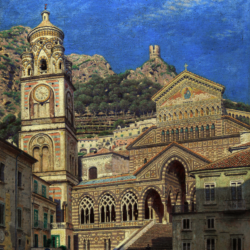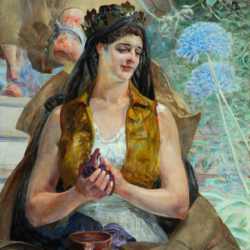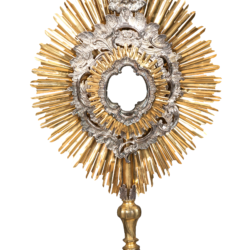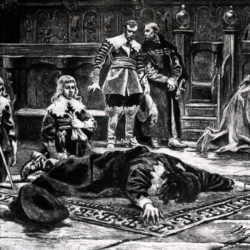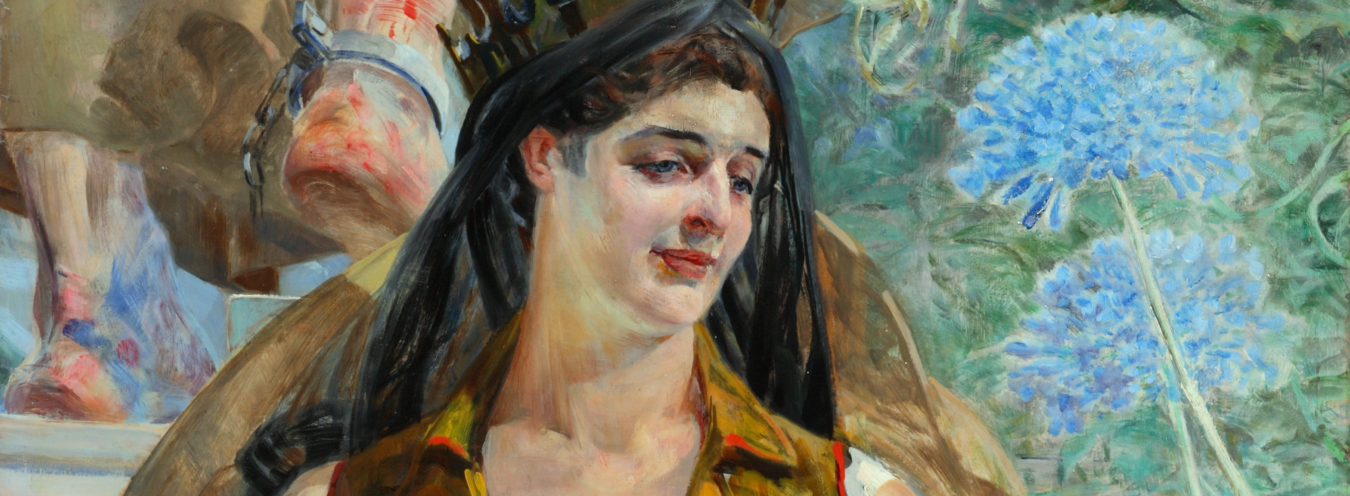
Henryk Sienkiewicz toward the lay Modernity
Sienkiewicz’s turn to the historical novel – toutes proportions gardées – stems from similar premises to those driving the thought of Schmitt: feeling weary of the bourgeoisie and Polish positivist liberalism, and searching for the essence of the human being as such, which the writer found in the times of intensified politicalism of the pre-modern times. After all, it is the theological categories which the writer already refers to in his first political article from 1877.[1] The surprise shown by many critics that Sienkiewicz while writing novels to “strengthen the hearts” leads us into quite unreassuring times, the days leading the Polish-Lithuanian Commonwealth into demise and decline[2] can be explained exactly by Schmitt’s conviction that no final, happy end of times would ever come and the meaning of history was the fight for ideals, making individuals, societies, nations, and civilizations closer to God, to His divine plan.[3] Maria Zadencka notices this in the context of Sienkiewicz’s historical novels in her analysis of The Deluge (Potop) with a reference to John Barclay’s swashbuckling romance Argenis (1621), an early-modern political and philosophical allegory:
Historical time is, however, regarded not only as a cyclical repetitiveness of situations but also as rising towards an ideal – and falling into political non-being: the plenitude and nothingness of the religious time of kairos.
From this perspective, the historical events in the Trilogy are also shaped as an “adventure” in the history of the nation and state, understood as a challenge that should be answered with a maximalist political agenda, a time when anything could happen.[4]
Sienkiewicz had to grapple with a phenomenon that Schmitt called depoliticization, which originated in Spinoza’s thought and reached its peak at the turn of the 20th century. It is understood as removing from “political and legal theory all elements related to the human being understood in metaphysical and theological terms.”[5] It came as a consequence of secularization and gradual confinement of the religious realm to the private sphere– a tendency started by Thomas Hobbes.
It might be justified, then, to draw a hypothesis that whereas Sienkiewicz’s personal religiousness was “tainted” with Polish positivist skepticism and agnosticism only to a degree and till a certain time,[6] his conviction about the importance of religion as a force for community and about the necessity to relate the worldly political issues with the immemorial order of Christian morality was unequivocal and deeply established from the very beginning. But most importantly, Sienkiewicz’s convictions and faith, which pervaded all his novels, permeated the Polish social organism preparing itself to become a modern European nation.[7]
This issue is exceedingly serious and must necessarily lead to a revision of past views on the question of religion in Sienkiewicz’s prose, especially its presence in the representational layer of historical novels. Let us return to the term used by Zadencka: kairos.[8]It is the Christian mode of understanding time, contrary to the concept of chronos, in which causality is important and the structure of time is linear. Anna Skórzyńska explains:
[K]airos was entirely different. Firstly, it was not linear. It was a point. But not a random point. This notion relates to an event of particular significance – a kind of awaited breakthrough. Simultaneously, the moment expresses plenitude, the most perfect time for something to happen. The etymology also points to vital forces, life, energy. Kairos, as opposed to chronos, is a desired time. It does not carry emptiness but meaning, or even depth.[9]
Przypisy
- [H. Sienkiewicz], “Poland and Russia. The Czar’s Government in Poland and on the Danube,” Daily Evening Post [San Francisco], September 8, 1877. Reprint Wiadomości. Tygodnik [London] 1965, vol. 4, p. 2. See also J. Axer, “Rok 1877 był to dziwny rok… Sienkiewicz wobec prorosyjskiej propagandy politycznej w Ameryce” [Sienkiewicz and pro-Russian political propaganda in the US], in Sienkiewicz polityczny. Sienkiewicz ideologiczny [Political Sienkiewicz. Ideological Sienkiewicz], edited by M. Gloger, R. Koziołek, Warsaw 2016.
- Compare M. Płachecki, “Role społeczne Sienkiewicza-pisarza” [Sienkiewicz’s social roles as a writer], in Sienkiewicz i epoki [Sienkiewicz and literary epochs], edited by E. Ihnatowicz, Warsaw 1999, pp. 231–233.
- Nota bene, this apocalyptic dimension of Sienkiewicz’s work was perceived very keenly by Mikhail Bulgakov as he was inspired by the Polish writer’s oeuvre, Pójdźmy za Nim! (Let’s follow him) and Qvo Vadis i.a., when he was creating The Master and Margarita. For more on the subject, see M. Gloger, “Agnostycyzm, apokryficzność, apokalipsa: Henryk Sienkiewicz i Michaił Bułhakow – religijne oświetlenia wzajemne” [Agnosticism, apocrypha, apocalypse: Henryk Sienkiewicz and Mikhail Bulgakov. Mutual religious enlightenement] (paper submitted for a conference proceedings publication entitled Henryk Sienkiewicz i chrześcijaństwo. Idee – obrazy – konteksty, Białystok 2017).
- See M. Zadencka, Obrazy suwerenności. O wyobraźni politycznej w literaturze polskiej XIX i XX wieku [Images of independence: On political imagination in Polish 19th- and 20th-century literature], Warsaw 2007, p. 48; trans. K. C.
- M.A. Cichocki, “Wstęp do pierwszego wydania” [Introduction], in C. Schmitt, Teologia polityczna, Kraków 2000, pp. 11–43; trans. K. C.
- See also M. Gloger, Sienkiewicz nowoczesny [Modern Sienkiewicz], Bydgoszcz 2010, (chapter 4, “Wobec religii” [In response to religion]).
- On the birth of nationality in the works of Sienkiewicz, see Sienkiewicz nowoczesny (Chapter 3).
- The nonlinear notion of time and the sacred time hold an important place in Voegelin’s thought as a manifestation of “self-illumination” of a given society, they are, however, juxtaposed with the diachronic order, the presence of which is felt strongly in Voegelin’s thought especially in the period before 1959. In Schmitt’s thought, who focused (contrary to Voegelin) not on the symbolic order within given societies but on the fundamental political and legal concepts, notions associated with time remain quite far in the background [editor’s note].
- A. Skórzyńska, Chrześcijańska koncepcja czasu, czyli kairos, chronos, katechon wobec eschatonu [Christian concept of time: kairos, chronos, and katechon against eschaton], September 5, 2013 http://europachristiana.org/news/kultura/284/chrzescijanska-koncepcja-czasu-czyli-kairos-chronos-i-katechon-wobec-eschatonu [accessed: 2017–12–06]; trans K. C.


